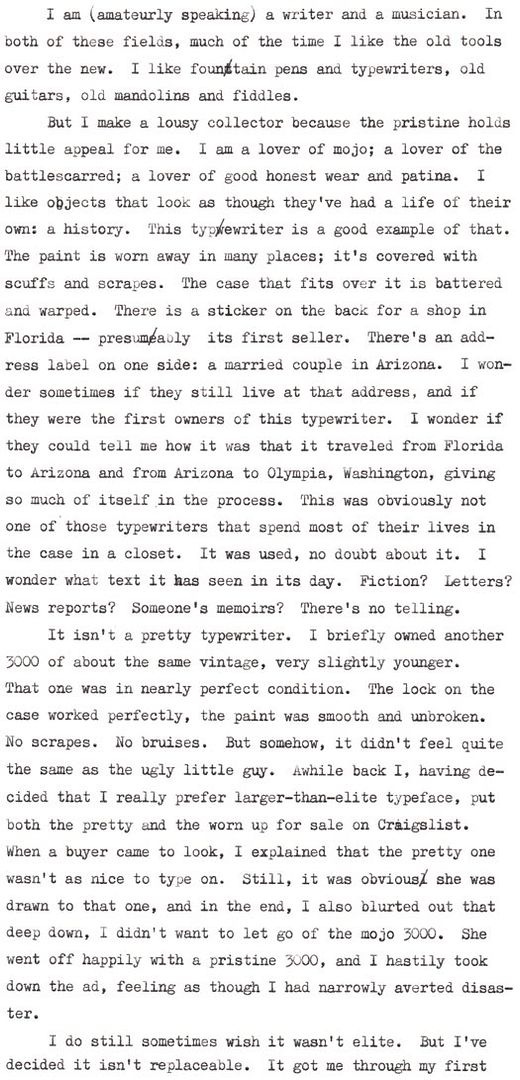Another note, continuing a bit from my original post, and getting a bit more personal.
1. I know people who don't understand the concept of reading fiction. They'll watch fictional movies or TV shows without a thought, but don't understand why one would read it just for pleasure. They see literary fiction as a shameful waste of time, or something for children. One of my co-workers flat-out states that he doesn't have the attention span for such reading. "Why would I read a book that might take me weeks when I could get the same basic story from a two hour movie, without having to work for it?" Apparently he's always felt this way -- even when he was little he never really enjoyed being read to or reading chapter books on his own -- too slow, he says. It's as if he's missing the part of us that enjoys processing words, that gets pleasure from internalizing a story in ways not possible with other media. He'll read to get information, but not for entertainment. Reading, to him = work. I've discussed this subject with him a number of times, and we just don't have a common ground to start from.
I can't imagine trying to explain to him why I like to write. You think *reading* fiction is slow? Ha! But he's not even a true minority. Most people can understand writing in a journal, though they may not be drawn to it themselves; but even people who enjoy books are often utterly baffled by the concept of writing fiction for fun, simply as a hobby, with no plans to make it a career. Is this because we've put writing on a bit of a pedestal these days? Because so much amateur fiction is so incredibly bad? Because writing is such a solo activity? Because writing without an audience is an incomplete action? Or another reason entirely? People understand playing sports for fun, or playing music for fun, to an extent at least. Writing is different. Why is that?
2. (Which will cause most folks to think, "Yeesh, you need to lighten up!") Being a Catholic who passionately believes in the tenets of my faith, I have moments now and then when I struggle a bit with the morality of my own fictional writing. First of all, is it sufficient for a story to be entertaining, or should it have -- at least in places -- some underlying lessons or philosophical thoughts (not overt preaching, by any means...but some basic, hidden morals, or at the very least a sense of good and evil)? And what about content: obviously even the best of people are flawed and tempted, and a good writer needs to include that side if the characters are to be realistic. Going further, in most stories there are plenty of people -- both "good" and "bad" in the full context of the story -- who commit violent acts and other immoral acts; people who make bad decisions, sinful decisions. It wouldn't be much of a story if everyone was picture perfect and exactly alike, without internal conflict and with all their motivations and choices above reproach. If it's clear that immoral actions are in fact immoral, is it OK to detail immorality? And if so, how much is necessary to make my point, and at what point does it become unhealthy dwelling upon lifestyles and behavior that I don't condone? What about profanity? It's pretty much required to give realism to certain characters, but since I don't use it in real life, I feel incredibly awkward putting the words in my characters mouths. I feel like a child trying to use big words I've just learned: transparently self-conscious about it.
And all of this, my friends, is why sometimes I think I'd be better off writing kids' books. I often feel like my stories lack maturity as a result of my own squeamishness and concerns about writing the bad stuff. Compounding that squeamishness is the fact that playacting the bad guys is disturbingly fun. For example, last year my NaNoWriMo story concerned, in part, a serial-killer-in-the-making. I alternated between the point of view of several characters, but his sections -- rife with self-centered paranoia and the rationalization of the unthinkable -- were the easiest and most enjoyable to write. I'm a little weirded out by that. I'm sure much of it stems from a natural desire to understand people and acts that are so contrary to our own lives, but is there more to it that that, a connection with the most base and perverted part of our human nature? It was both intoxicating and unnerving. To an extent, as authors we temporarily become the characters we are writing: we try to think their thoughts, speak with their voices, make their actions real to ourselves so we can explain them on the page. It's very intimate. I suppose the feelings I experience when writing these types of characters aren't much different from the slightly guilty thrill we may get from reading mystery novels, or watching violent movies or graphic crime investigation shows; but it goes so much deeper that it can be a bit scary.
3. Apropos of nothing.... After only a week of deprivation, I gotta say I really, really miss using Bernard, the Olympia SG3. I know it's not as though I don't have four or five other typewriters I could use (Stinky, the Mojo 3000, the nice SM-9, the Classic 12, or the old Corona Standard), but I want to use Bernard. (My inner child is stamping and pouting as it screams out that last bit.) The others are OK, but they aren't the same. I'm spoiled forever. I want the weight and bulk of it beneath my hands, the smooth action of that BIG return lever, the paper feed lever, that lovely key action, the Senatorial typeface. *snif* I think I've found my typewriter, and it's killing me not being able to use it for the time being. It shouldn't be more than a few weeks at most before I get the platen back, but I am not known for my patience. I feel like I'm filled to overflowing with things I need to write, but writing by any other means just isn't quite right.








